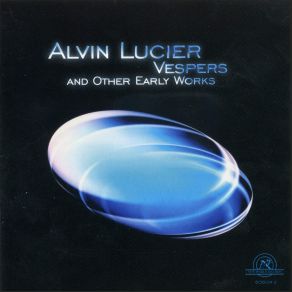Alvin Lucier: Vespers and Other Early Works
Download links and information about Alvin Lucier: Vespers and Other Early Works by Alvin Lucier. This album was released in 2002 and it belongs to Electronica genres. It contains 5 tracks with total duration of 01:05:09 minutes.

|
|
|---|---|
| Artist: | Alvin Lucier |
| Release date: | 2002 |
| Genre: | Electronica |
| Tracks: | 5 |
| Duration: | 01:05:09 |
| Buy it NOW at: | |
| Buy on iTunes $9.99 | |
Tracks
[Edit]| No. | Title | Length |
|---|---|---|
| 1. | Vespers | 15:59 |
| 2. | Chambers | 14:27 |
| 3. | North American Time Capsule | 10:42 |
| 4. | (Middletown) Memory Space (featuring Matthew Welch, Ryuko Mizutani, Charlie Looker, Rees Archibald) | 16:39 |
| 5. | Elegy for Albert Anastasia | 7:22 |
Details
[Edit]"There is nothing like "Vespers" in the literature of music," writes Robert Ashley in his liner notes; in Alvin Lucier's case the hype is justified, as showcased on the Vespers and Other Early Works compilation. In "Vespers," performers equipped with Sondols (sonar dolphin echolocation devices) move around the performing space, creating an image of it in the listener's perception. Though no stereo version can faithfully reproduce the music's spatial aspect, the version here is mesmerizingly beautiful. Lucier's pioneering work can be seen as the precursor of many developments in today's music. "Chambers" predates Toshiya Tsunoda's experiments recording with microphones inside closed spaces by 30 years; and the almost inaudible "Elegy for Albert Anastasia" (1963) is the forerunner of "lowercase" composers such as Francisco López, Bernhard Günter, and Steve Roden. Also included here is the long overdue reissue of 1967's "North American Time Capsule," where Lucier uses Sylvania vocoders to analyse and produce purely electronic versions of spoken and other sounds, as "a message to listeners who don't know about us." "(Middletown) Memory Space" instructs performers to go out into a city and record, by any means, its sounds, in order to return to the performance space and "recreate, solely by means of your voices and instruments, those outside sound situations." This version for koto, shakuhachi, guitar, accordion, and piano is exquisite — and that's where the true significance of Lucier's work lies: the musical realization of his concepts is as striking and memorable as the concepts themselves.